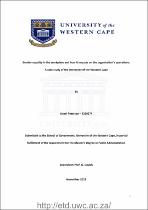| dc.contributor.advisor | Davis, G | |
| dc.contributor.author | Petersen, Liezel | |
| dc.date.accessioned | 2023-05-10T07:51:13Z | |
| dc.date.available | 2023-05-10T07:51:13Z | |
| dc.date.issued | 2023 | |
| dc.identifier.uri | http://hdl.handle.net/11394/9883 | |
| dc.description | Masters in Public Administration - MPA | en_US |
| dc.description.abstract | This study focusses on the impact of gender equality on the workplace and its operations and how it has evolved within the organisation.
South Africa, historically, was a patriarchal society and male dominance was the social accepted order. This was evident in all spheres of society and women generally were relegated to a subservient role. This was particularly evident in the place of work where artificial glass ceilings were created for women. The workplace is mostly male dominated and they hold these senior positions. Women on the other hand hold positions such as cleaners, administrators and supervisors but rarely occupy senior and executive positions. This prevailing social construct stems from the patriarchal belief and societal cultural values. The prevailing practices therefore, in places of work, reflected the prevailing societal value system. | en_US |
| dc.language.iso | en | en_US |
| dc.publisher | University of the Western Cape | en_US |
| dc.subject | Gender | en_US |
| dc.subject | Gender and development | en_US |
| dc.subject | Employment equity | en_US |
| dc.subject | Income gaps | en_US |
| dc.subject | Gender regulations | en_US |
| dc.title | Gender equality in the workplace and how it impacts on the organisation’s operations: A case study of the University of the Western Cape | en_US |
| dc.rights.holder | University of the Western Cape | en_US |

